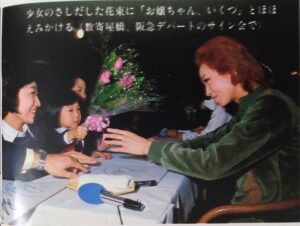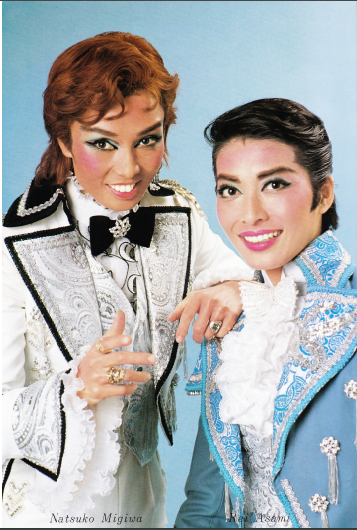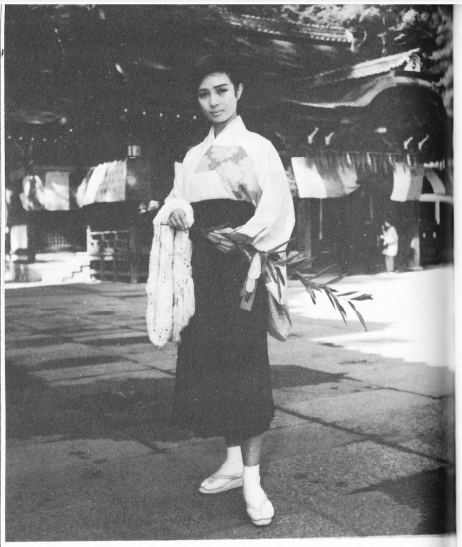This book, which is something of an ‘oral history’ of Takarazuka’s Rose of Versailles adaptations, was published by Ascom in late 2005, and features chronological accounts from otokoyaku who had performed in the franchise from its first origins through the 2001 productions. Since the book is derived from transcriptions of interviews taking place often many decades after the fact, there may be discrepancies between accounts.
Please note that the term appearing through the text as ‘theatre-comic’ is translated from the Japanese term gekiga [劇画]. Although this term is described as applying to mainly male-oriented comics in most English-language sources, this not accurate. The definition of this word changed to also include sweeping, romantic female-oriented works with Rose of Versailles being arguably the most famous of theatre-comics. Takarazuka even published its own magazine of theatre-comics in the 1970s.
Chapters have been split in two to make them more readable without too much scrolling to reach the explanatory footnotes. Some paragraph breaks have also been added for ease of reading in English. I have also included some images printed in the book as well as sourcing many other archival images to illustrate the text.
Installments will be posted every two weeks, with some breaks if the next chapter is not complete.
(Please note some images used in this chapter are from photographs rather than scans; I hope to replace these with better quality scanned versions later.)
Fated for Oscar
I felt personally like I wasn’t suited for this kind of world. I was indoorsy, I had a pretty nondescript and introverted personality, I didn’t have a lot of friends, I liked playing the piano silently by myself—that was the kind of person I was. And on top of that, whatever I tried to do I was really slow and clumsy at it.
When I was a junior actress, I had to handle organizing luggage and cleaning everything up, everything like that, but I was so slow at it that I was always the last one onto the bus.1 Because of that, I always got scolded. No matter who in my year was late, I’d be scolded as the representative… (laughs)
But really, even in real performances, I’d be late for my entrance in every production! For example, I’d normally be chatting in the dressing room, and then, I’d suddenly realize my scene had already ended… Unbelievable, right? But it happened all the time (laughs). So, I feel like, once entering Takarazuka, my awareness of “I can’t be late! I have to do this right!” was increased way beyond normal people.
And, it wasn’t like I was physically blessed in terms of my face or height either… I was specially picked out for roles early on, but I didn’t like that at all. If I was given roles beyond my abilities, all that meant for me was painful emotions and desperation since I would have to strive towards it in response and catch up somehow.

Since I was plagued by this complex of ‘I’m no good’, when I became Top Star, even if people would say “You’re so cool, so cool,” I’d think ‘are these backhanded compliments?’ I couldn’t accept it honestly, so I’d end up feeling inferior and putting myself down… I was really lonely somehow. In a way, I suppose I was just too self-aware…
I was strict towards myself, and strict towards everyone else, and I even kept getting cross with the fans I should have been grateful for (laughs). I’d even tell fans lining up outside the rehearsal room “Don’t you have school to go to? What are you doing out here? Go home!” Even though it would have been easy enough to just say “Thank you!” and smile (laughs).
That’s why, when it came time to retire, I felt that since I had gone through all of that, I had to have an ending cool enough to make up for it. The sense of responsibility to set down the burden [of Top Stardom] properly ended up feeling strongest, I think.
But…how do I put it…since I’m a Kansai native, I always wanted to say something funny to make the audience laugh—that comedy instinct was really strong. I think it might be thanks to that that I got this far. Even now that hasn’t changed, but it’s not laughter that makes me happy! When I’m trying to set up a joke and it goes over, it’s the most amazing feeling! I worked so hard to get there.

In comedy shows in particular, I thought things through every performance and tried to deliver lines differently. Though thinking about it now, that was a bit cheeky of me (laughs). I would even read newspapers—and I never read newspapers otherwise—looking for any material. I’d think about it in bed too, and if I thought of something I’d start laughing to myself in bed. If there were 60 shows in a 2 month production, I’d say 60 different things. I felt pressure from that, of course, but I’d start laughing to myself wondering ‘Will this land…?’ and then when I did it onstage and got a big reaction in response I’d be so happy!!
That’s the best thing for me. It makes me so happy, and I think that’s why for 41 years since my debut I’ve been performing in that cheeky way.
It’s pretentious to put it this way, but I feel like performing in front of an audience is the only time I can prove to myself I’m really alive. Performing in front of people, making them laugh, seeing them enjoy themselves…I live on the happiness of those moments, that feeling of ‘this is what it’s like to be alive’. Even now those are the times I’m happiest. See, if you took that away, it might not be like the huge gap I experienced in the past, but my days would still be empty. I don’t have kids or a husband, so if I have a scene I can appear in, I’m thinking ‘I want to make the audience pay attention to me!’ I’m totally hungry for attention.
But still, I think it’s thanks to ‘Berubara’ that I can still be so hungry on stage even now. Back then, since I was in Berubara, the amount of work outside Takarazuka I had suddenly soared. I had focus features in newspapers and magazines, I had appearances on TV shows like Music Fair2. It was then that the average citizen became aware of the name ‘Migiwa Natsuko’.
Therefore, Oscar is very important to me as my ‘fate’. Even though I gave up on it at one point, I was wonderfully lucky to encounter Berubara, and I’m intensely grateful for it. After all, just being in Takarazuka doesn’t mean you’ll be able to appear in Berubara: it’s just the luck of timing.
In that sense, I think there wasn’t any generation [in Takarazuka] as blessed as we were. To be able to perform with so many incredible people like Haruna-san or Ootori-san, to get invited to so many events even after retiring, it’s really surprising. For the Berubara 30th anniversary event, I was asked to appear in it, but I’ve been thinking that if there are too many people from our era compared to the others, maybe we’ll look a bit full of ourselves? (laughs)
Even so, I suppose there is a certain weight to being the first. And I think my feelings towards Director Hasegawa and Director Ueda, who created the whole thing from scratch, are also a bit different. I think now, because 30 years have passed, I can really feel the weight of that aspect of being “first” more personally.

Even after retiring, I’ll sometimes unexpectedly get asked to appear on television, but I really can’t get used to television, I’m really hopeless… Somehow, whenever I’m on television I get so nervous, and even now it’s still my weakness (laughs). Maybe it’s because I was trained on the stage, but I can’t stand the mechanical, inorganic surroundings of a television studio. When all’s said and done, it’s the stage I love with the smell of the wooden boards around me.
Still, then and now, ‘gallant and brave’ remains my motto, so recently I’ve been thinking that I don’t want anyone to see me as un-cool. I kind of want to disappear while I’d still be missed, at a point where people would still think “but you could keep going”…I have that pretentious sense of aesthetics. Since I’m “Knows-when-to-quit Natsuko”. Though I’m also called “On-the-verge-of-[Quitting] Natsuko”3 (laughs).
If I hadn’t entered Takarazuka…I definitely would have ended up becoming “a sweet and modest wife”! Bowing properly with three fingers on the floor to say “welcome in,” that kind of world. But I’d definitely be trying way too hard to achieve that perfectionism, so I think even my spouse would find it exhausting to deal with.
Well, anyway, I don’t have any plans to get married, and I don’t need a husband at all. (laughs)
Berubara Q&A – Migiwa Natsuko
Q – If I say ‘Takarazuka’, what do you think of?
A – Being absorbed in ‘splendor’. Also, that it’s a source of pride I will carry all my life.
Q – If I say ‘Berubara’?
A – Oscar.
Q – What message would you currently want to give Oscar?
A – I don’t have anything to say to Oscar. Are you happy in heaven?
Q – What message would you currently want to give Andre?
A – Thank you for loving Oscar.
Q – What message would you currently want to give Fersen?
A – Were you genuinely happy to be born into this time? Were you unhappy? Did you suffer in your love for Marie Antoinette?
Q – If you could request one thing from Takarazuka, what would it be?
A – No requests, but…the amusement park and the zoo are both gone now, so it’s a bit sad to see the environment change.
Q – If you were reborn, would you join Takarazuka again?
A – No, no, I’ve lived plenty so I think I’m fine (laughs).
Extra questions
Q – What are your favorite Takarazuka lines?
A – From Johnny on the Hill: “Living is a wonderful thing, you know.” Also, what Okita Souji says right before dying, as he’s looking at the autumn leaves: “I want you to always remember the color of those crimson leaves…”
Q – What otokoyaku characters have you fallen for as a woman?
A – Villains are sexier than virtuous heroes to me, and I like them more.
Q – What roles did you struggle with?
A – Oscar was really difficult. That position between ‘man’ and ‘woman’…
Q – What roles would you like to perform again?
A – Okita Souji and Johnny from Johnny on the Hill. They’re both such beautiful youths…I’m so full of myself (laughs).
1 – Migawa is likely referring to a practice in Showa/early Heisei era where the most junior members of tours would be responsible for tidying up on the way out of a venue (although it is unclear if this practice still continues).
2 – Japan’s longest-running music show, which has been broadcasting since 1964.
3 – These two phrases are puns on her stage surname, “Migiwa” – “Hikigiwa” and “Magiwa” respectively.
